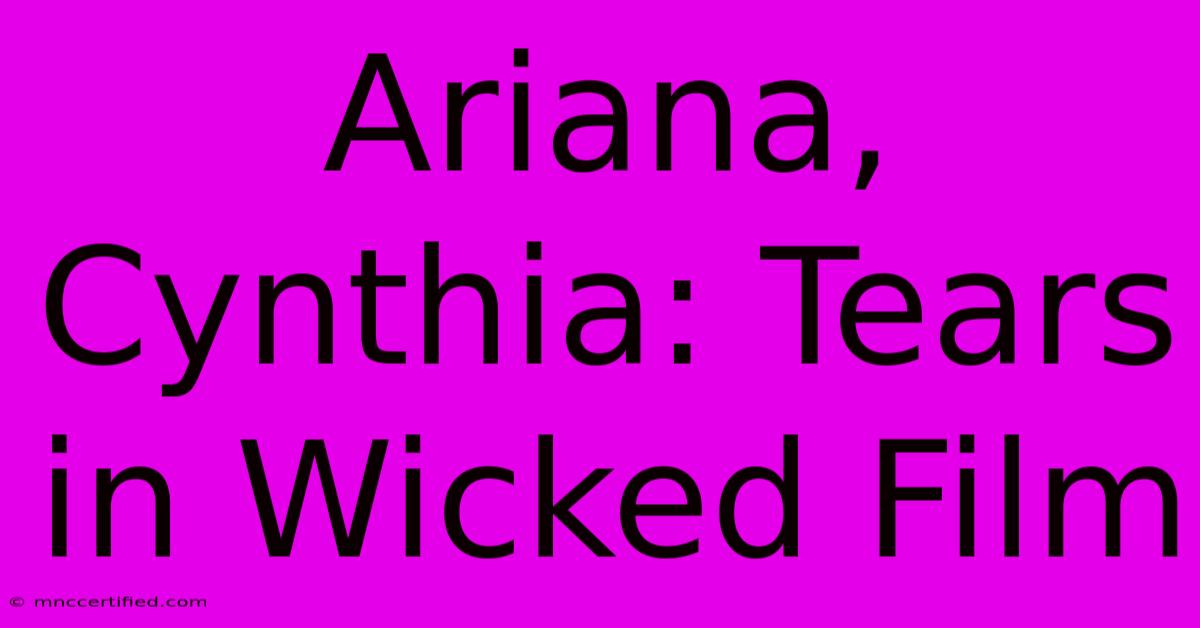Ariana, Cynthia: Tears In Wicked Film

Table of Contents
Ariana Grande and Cynthia Erivo: The Emotional Power of Tears in the Wicked Movie
The highly anticipated film adaptation of the Broadway mega-hit Wicked has generated immense buzz, and rightfully so. Beyond the dazzling costumes, spectacular sets, and incredible musical numbers, the film's emotional core rests heavily on the performances of Ariana Grande as Glinda and Cynthia Erivo as Elphaba. Specifically, the tears shed by both actresses throughout the film are not merely a visual effect; they are powerful tools conveying the complex emotional journeys of these iconic characters. This article will explore the significance of tears in the Wicked movie, focusing on the performances of Grande and Erivo, and how these emotional moments elevate the narrative.
The Tears of Glinda: Innocence and Understanding
Ariana Grande's portrayal of Glinda, the bubbly and seemingly carefree Good Witch, is nuanced and surprisingly vulnerable. While initially presented as the polar opposite of Elphaba, Glinda's tears unveil a deeper emotional landscape. Her tears are not simply expressions of sadness; they often represent a growing understanding and empathy for Elphaba's plight. We see this subtly throughout the film, particularly in scenes where Glinda witnesses Elphaba's struggles with prejudice and isolation. These moments highlight Grande's ability to convey the evolution of Glinda's character—from naive optimism to compassionate understanding. Grande's subtle delivery of these tearful moments emphasizes the depth of Glinda’s emotional arc.
Specific Scenes to Highlight:
- The confrontation scene with Madame Morrible: Glinda's tears here show her growing disillusionment with the Wizard's regime and the unjust treatment of Elphaba.
- The scene where Elphaba is wrongly accused: Glinda's tears reflect her helplessness and guilt at being unable to prevent Elphaba's suffering.
- The final scenes: Glinda's tears here encapsulate the bittersweet nature of their friendship and the realization of the complexities of good and evil.
These tearful moments are not merely sentimental; they are integral to the narrative's progression, revealing Glinda's internal struggle and her eventual acceptance of Elphaba's perspective.
The Tears of Elphaba: Resilience and Heartbreak
Cynthia Erivo's Elphaba is a powerful and commanding performance. Her tears, however, are not solely indicators of weakness but rather powerful expressions of resilience in the face of adversity. Elphaba's tears often reflect the weight of her experiences—the loneliness, the prejudice, and the constant fight for justice. Erivo’s portrayal expertly balances Elphaba’s strength with her vulnerability, making her tears all the more impactful.
Moments to Consider:
- Elphaba's early scenes: Her tears reflect the pain of isolation and her struggle to fit in.
- Her relationship with Fiyero: Erivo’s portrayal of Elphaba's heartbreak upon Fiyero's death is particularly poignant and deeply moving. The tears here are raw and heartbreaking, showing the depth of her emotions.
- The final confrontation: Her tears here are a complex mix of sadness, anger, and a quiet acceptance of her fate.
These instances showcase Erivo's remarkable acting range, demonstrating Elphaba's unwavering strength even in the face of overwhelming sorrow. Her tears are not a sign of defeat but a testament to her enduring spirit.
The Power of Shared Tears: Friendship and Understanding
Ultimately, the tears shed by both Grande and Erivo serve to highlight the profound connection between Glinda and Elphaba. Their shared tears—whether shed in parallel or in response to each other's emotions—underscore the complexities of their relationship and the power of their friendship, even amidst their differences. These emotional moments are crucial in establishing the central theme of the story: the enduring power of understanding and acceptance, even in the face of seemingly irreconcilable differences.
Conclusion: More Than Just Tears
The tears in the Wicked movie, specifically those portrayed by Ariana Grande and Cynthia Erivo, are much more than just visual effects. They are critical components of the narrative, driving the emotional arc of the story and deepening our understanding of Glinda and Elphaba's complex relationship. The film's success is significantly enhanced by the actresses’ ability to convey such a range of emotions through these powerful and nuanced performances. This skillful use of tears is a testament to the quality of the acting and the emotional depth of the film adaptation.

Thank you for visiting our website wich cover about Ariana, Cynthia: Tears In Wicked Film. We hope the information provided has been useful to you. Feel free to contact us if you have any questions or need further assistance. See you next time and dont miss to bookmark.
Featured Posts
-
November 22nd Nba Lakers Lose To Orlando
Nov 23, 2024
-
Good For 5 Cents In Trade Token
Nov 23, 2024
-
Conor Mc Gregor Jury Delivers Verdict
Nov 23, 2024
-
Pennsylvania Halts Senate Race Recount
Nov 23, 2024
-
Security Alert Us Embassy London Package
Nov 23, 2024